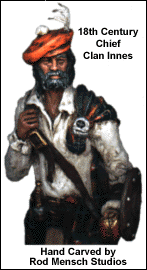
|
The Acts Against Highland Dress
During the '45', the Highlanders under Bonnie Prince Charlie almost succeeded in conquering England. King George the Second was in Hanover, and most of the English army was off fighting in Germany and Flanders. If not for a series of events that changed the obvious outcome of the Jacobite rebellion, the Highlanders - and not the British - would have ruled Scotland.
Soon after the rebellion was put down, the English implemented a series of Acts to eliminate the Scottish threat. Ingenious in their conception, these laws not only restored order, they virtually eliminated a way of life by destroying the clans, their identities and economic structures. That the laws were harsh is true but, considering the fact they were implemented within a context of fear, they are understandable. Fear that this rebellion could happen again, and the next time with more successful results.
As an imperial nation, Britain was used to fighting outside of its own borders, and the fact that a so-called 'ill-equipped, ill-led rabble of barbarians' almost succeeded in taking over the country shook its leadership deep down to its roots. Legislation went into effect quickly: the time from the defeat of the Scots until implementation of the first Act was only months. The rule of the Scottish lairds and their absolute control of the Clans had to be broken, and very soon. On August 1st, 1746 the Act of Proscription went into effect. This was the first of the 'Kings laws' bent on breaking the back of the Scottish system of government and independent life. It was largely a reiteration of an earlier act, The Disarming Act, but this time the penalties were harsher and much more thoroughly enforced.
Abolition and Proscription of the Highland Dress The penalty for the owning or carrying of arms (weapons) under the new Act of Proscription was death. The wearing of the kilt or tartan was also punishable unless worn by a soldier actually serving the crown. Other portions of the Act of Proscription prohibited the playing of bagpipes, the gathering of people, and teaching Gaelic, the Highlander's native tongue. The punishments for these lesser offenses were fines, jail time or transportation to the colonies. Once transported, the "criminal's" punishment consisted of seven years, indentured slavery.
The Act of Proscription was closely followed by the Heritable Jurisdictions Act. This new Act forced all Scottish landowners to either accept English jurisdiction or forfeit their lands. All Scottish heritable sherriffdoms reverted to the English crown, and other heritable jurisdictions, including regalities, came under the power of the English court.
The impact of these Acts on all levels of Scottish society was swift and brutal. Landed peers who participated in the '45 had already lost their territory to the English outright. Now all the remaining lords of the land lost power over their subjects except the rights of landlord. The English system of law was forced on to the people and nobody could change it.
The Scottish Highlanders lost their culture: they were forbidden to dress in the style of their ancestors and could not carry or own a weapon. They could not listen to bagpipes and were even forbidden from participating in Highland Games due to the laws against gathering. Their whole way of life was turned upside down and shaken vigorously. The clan chiefs and lairds whom they normally would turn to in times of trouble no longer had the authority to do anything.
Many Scots could not stand to live under these harsh rules and so they immigrated to the colonies. For other men of the time, the only way to preserve the way of life they knew was to join the English army. At least in the Army, Highlanders could wear the kilt and hold a sword again, thus retaining some of their pride. Ironically, many of these men later died fighting their 'brothers' who had immigrated to the colonies, or while placing the heel of English authority over other peoples.
By the time these repressive laws were finally repealed in 1782, the damage was already done. A generation and in some cases, two generations of children had been born and were raised not knowing the language, dress and customs of their ancestors. It is a tribute to the strength of the Scottish Highlanders that even today, the old ways of life are remembered and honored. And even more amazingly, their spirit remains and is manifest in the successful referenda that recently recreated the Scottish Parliament.
Repeal of the Act Prescribing the Wearing of Highland Dress by BW and MJ, February 2000
Some Classic Books on the Subject:
Collie, George F. Highland Dress, published 1948
Logan, James The Scottish Gael, published 1831
Logan, James, The Clans of the Scottish Highlands, published 1845
Sobieski Stolberg Stuart, John and Stuart, Charles Edward The Costumes of the Clans, published 1845
Adam, Frank The Clans, Septs and Regiments of the Scottish Highlands, published 1904
Innis, Sir Thomas Tartans of the Clans and Families of Scotland, published 1938
McClintock, H.F. Old Irish and Highland Dress, published, 1943
Links:
Skye's Scottish History Timeline
History of Scottish Heavy Events
Brutal Betrayals-The Horror of the Scottish Highland Clearances
|
Thursday, December 26th, 2019
Attention visitors: Tartans.com is back. Please note that this is a snapshot of the site as it existed nearly 20 years ago and you may encounter broken links; we are still combing through the site and correcting those as we find them. Please also note that some sections are currently not functional, primarily the discussion forums/clan chat boards.
|
** HOME - First Time Visitors - Glossary - - Contact Us ** Awards | Bibliography | Clan Calendar | Clan Chat | Clan Finder | History | Famous Scots | Genealogy | Great Hall of the Clans | Links | News and Features | Scots on the Net | Search | Site Map The Gathering of the Clans
Copyright 1995- Tartans.com - All Rights Reserved. |


